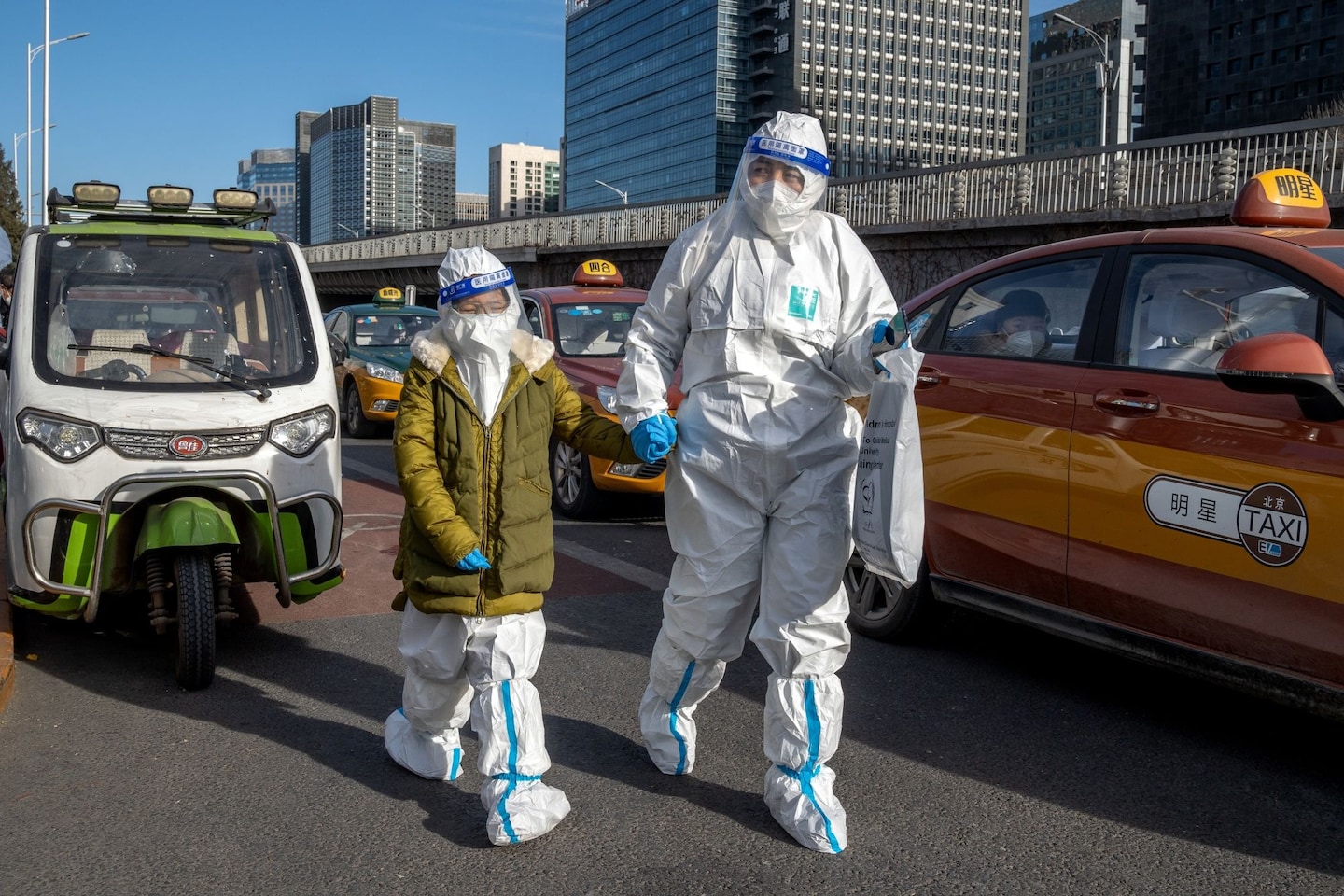Pharmacies across the country have run out of fever medications, as well as traditional herbal remedies. Supermarkets and online retailers are being bought out of foods rumored to aid recovery. Pfizer-made antiviral Paxlovid sold out almost immediately at nearly $430 per box when online pharmacy 111.inc opened sales on Tuesday.
Esther Cui, a 28-year-old living in the eastern city of Hangzhou, visited eight pharmacies on Thursday but they were sold out of Ibuprofen and Tylenol as well as Shuanghuanglian and Lianhua Qingwen, two traditional Chinese herbal remedies promoted as covid treatments by the government.
“At one pharmacy, the clerk just put two packs of medicine that I hadn’t heard of in my hands and told me to buy them because they were also running out,” she said. “There have been so many changes to the epidemic prevention policy over the past few years that caught people off guard. Eventually, we reacted to any hint of change with all-out preparations.”
The demand for self-medication products and tips has led to a flurry of questionable health care advice — and some plain misinformation — to proliferate online.
A Marxism scholar at the Chinese Academy of Social Sciences, Jin Riguang, recommended chewing Sichuan peppercorn, a numbing spice, and drinking ginger-licorice tea. Canned peaches and lemons sold out on many platforms after being promoted as home remedy.
State media has warned people that washing your mouth out with salt water and drinking high-alcohol content distilled grain spirits do not kill the virus or prevent infection.
Even advice about staying hydrated had to be qualified with reminders not to overdo it, after Chinese state media reported that a coronavirus patient in southwestern Chengdu gave herself water intoxication while following official advice to drink lots to aid recovery.
An electrolyte sports drink called “Alienergy” made by Genki Forest ran out after sales on some online platforms increased by 2,000 percent in a day over rumors it would provide better hydration than water.
Officials have cautioned against panic buying which could inadvertently prevent medicines and other valuable health care products from reaching patients in time. One proponent of traditional Chinese medicines, Zhang Boli, advised against being anxious because being in a bad mood could lower immunity.
Public unease has been worsened, however, because the full scale of outbreak is unclear. After the sudden removal of requirements for regular PCR testing, authorities said they were no longer able to keep track of positive tests and scrapped daily reports of asymptomatic tests. A new system of classification and reporting for covid deaths reportedly has made it harder for cases to be included.
Some online services that until days ago showed detailed breakdowns of infections have stopped updating recently. A search for the latest outbreak data on Baidu, China’s largest search engine, now results in a count of how many people have asked for medical advice using the website’s online consultation service, rather than the number of infections.
Difficulties in finding accurate and up-to-date information means that many people have relied on word-of-mouth to gauge how fast the virus in spreading. For some, the wave hit suddenly.
“I really didn’t have any sense of crisis last week and didn’t think about getting any drugs as others started to stock up,” said Tim Liao, 30, a design consultant working in Shanghai. Liao felt a fever and tiredness coming on Monday evening and regretted not buying medicine beforehand. Online stores were sold out. Shaking with sickness, he felt unable to go to the pharmacy himself. Friends sent him the drugs the next day.
In virus hot spots, self-enforced lockdown has put even greater strain on logistic networks than the previous state-mandated lockdowns. Not only are food delivery and online retailers facing huge numbers of orders, but many of the drivers are also testing positive. Companies like Eleme and Meituan are hiring new workers in major cities to work through logjams.
Liao said it was inevitable that China would change its covid policy, but he suspects the government did little to prepare. “The only thing they did is abandon testing so we wouldn’t know how many people have caught the virus,” he said.
The government on Wednesday acknowledge a shortage of rapid antigen tests, which had not been widely used before last week’s announcement. Amid the rising demand, scalpers have been reselling kits at high prices online.
To combat public unease, official propaganda has reversed course. After months of underscoring the severity of coronavirus infection to justify increasingly unpopular lockdowns, Chinese health care experts are now trying to sooth public fears of getting sick.
Zhong Nanshan, a top respiratory disease expert and widely respected government adviser, said on Thursday that coronavirus should now be considered “a novel coronavirus cold,” not pneumonia, noting that the mortality rate omicron was now 0.1 percent and comparable to seasonal influenza.
Easing public fears is also an attempt to ensure that limited medical resources are not spent dealing with nonsevere cases. Officials have already warned the public against calling emergency services until they are in serious need of professional treatment.
A Chinese government-funded analysis by researchers in Hong Kong released this week found that total reopening in all areas of the county could result in nearly 1.1 million deaths and a surge in demand for hospital treatment that would be 1.5 to 2.5 times higher than capacity. With a gradual opening that gave time for 85 percent of the population to receive a fourth booster and 60 percent having access to antivirals, the number of estimated deaths fell to around 600,000.
Such dire predictions have led many Chinese families to err on the side of caution.
Luo Xia, 35, a translator who lives in Shenzhen, began making orders for herself and her family in mid-November when she first suspected a change in policy was coming. “I was worried for my parents, especially my mom. She doesn’t have good lungs,” she said.
When health authorities on Dec. 7 published a 10-point plan to relax covid controls, Luo turned to online platforms again to search for Ibuprofen but couldn’t find any immediately. She eventually made orders at an online store that sold the pills for three times the amount of the normal price. It took eight days for the shipment to be dispatched, instead of the usual two or three.
“You really have to make the right predictions and react quickly,” she said, adding that even she hadn’t expected the covid rules to be relaxed so fast. “The better solution would be for the central government to tell local governments what to prepare in advance. But it looks like some local governments made zero preparations.”
Pei-Lin Wu in Taipei and Lyric Li in Seoul contributed to this report.



